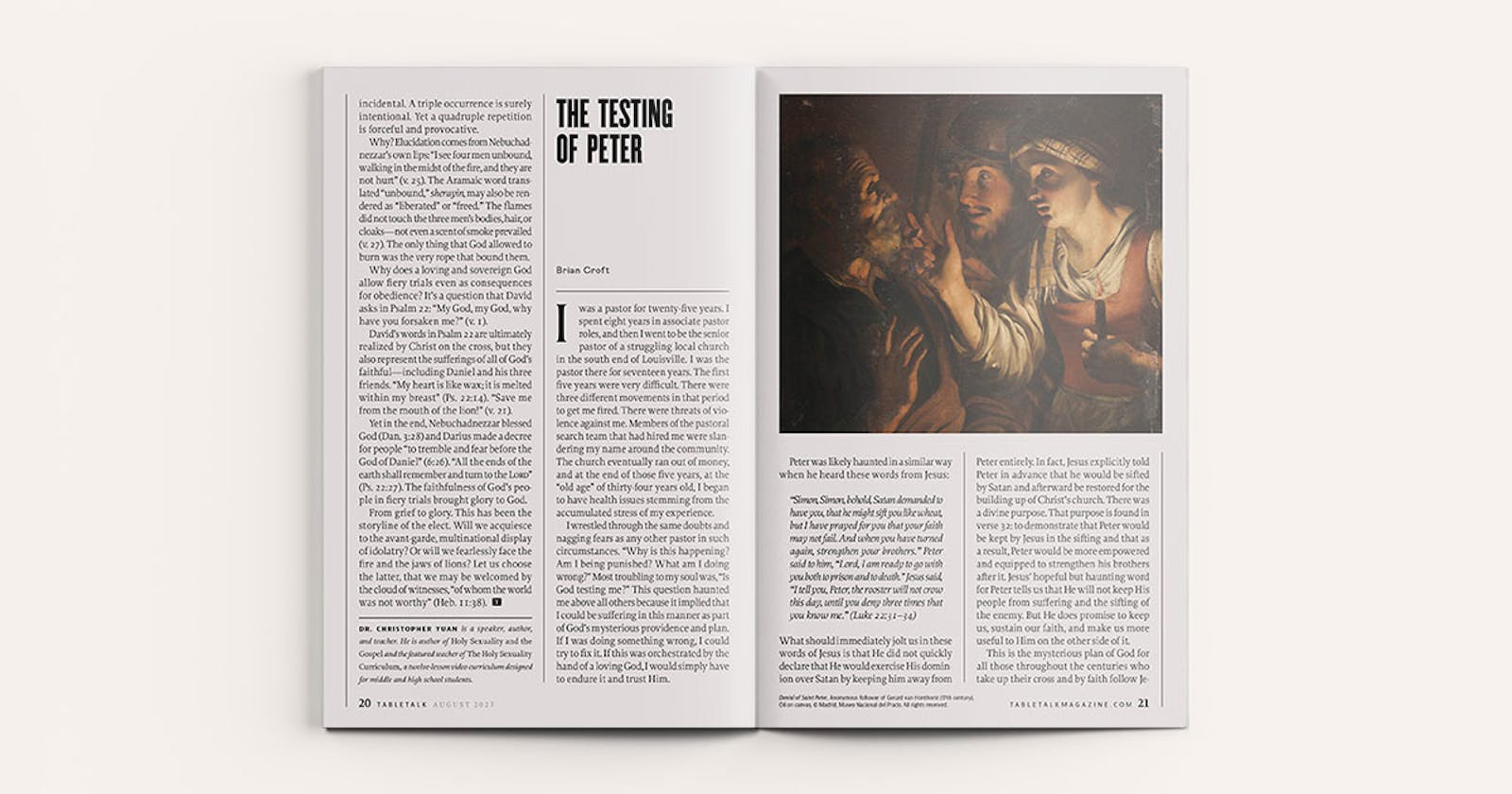
Request your free, three-month trial to Tabletalk magazine. You’ll receive the print issue monthly and gain immediate digital access to decades of archives. This trial is risk-free. No credit card required.
Try Tabletalk NowAlready receive Tabletalk magazine every month?
Verify your email address to gain unlimited access.
I was a pastor for twenty-five years. I spent eight years in associate pastor roles, and then I went to be the senior pastor of a struggling local church in the south end of Louisville. I was the pastor there for seventeen years. The first five years were very difficult. There were three different movements in that period to get me fired. There were threats of violence against me. Members of the pastoral search team that had hired me were slandering my name around the community. The church eventually ran out of money, and at the end of those five years, at the “old age” of thirty-four years old, I began to have health issues stemming from the accumulated stress of my experience.
I wrestled through the same doubts and nagging fears as any other pastor in such circumstances. “Why is this happening? Am I being punished? What am I doing wrong?” Most troubling to my soul was, “Is God testing me?” This question haunted me above all others because it implied that I could be suffering in this manner as part of God’s mysterious providence and plan. If I was doing something wrong, I could try to fix it. If this was orchestrated by the hand of a loving God, I would simply have to endure it and trust Him.
Peter was likely haunted in a similar way when he heard these words from Jesus:
“Simon, Simon, behold, Satan demanded to have you, that he might sift you like wheat, but I have prayed for you that your faith may not fail. And when you have turned again, strengthen your brothers.” Peter said to him, “Lord, I am ready to go with you both to prison and to death.” Jesus said, “I tell you, Peter, the rooster will not crow this day, until you deny three times that you know me.” (Luke 22:31–34)
What should immediately jolt us in these words of Jesus is that He did not quickly declare that He would exercise His dominion over Satan by keeping him away from Peter entirely. In fact, Jesus explicitly told Peter in advance that he would be sifted by Satan and afterward be restored for the building up of Christ’s church. There was a divine purpose. That purpose is found in verse 32: to demonstrate that Peter would be kept by Jesus in the sifting and that as a result, Peter would be more empowered and equipped to strengthen his brothers after it. Jesus’ hopeful but haunting word for Peter tells us that He will not keep His people from suffering and the sifting of the enemy. But He does promise to keep us, sustain our faith, and make us more useful to Him on the other side of it.
This is the mysterious plan of God for all those throughout the centuries who take up their cross and by faith follow Jesus. God does not promise full protection from the temptations and trials of a fallen world or from the sifting and attacks of the enemy. But He does promise always to be with us, to sustain us, and to keep us by His powerful hand (Jude 24–25) and His prayerful mediating work (Heb. 4:14–16) before His heavenly Father. And like Peter, when we come out on the other side of our trials, temptations, and testings, we will be more useful to our Redeemer and more useful in the lives of others (1 Peter 5:10).

This proved true in my own life. After those five brutal years at the church, I decided to stay. In the mysterious providence of God, at year six something changed. The ship turned and the church began to flourish. People began to come to Christ. God sent people who would become some of our most faithful members. God sent men and women for us to train for the ministry and send out. And God redeemed many of my relationships with my adversaries, who later became some of the dearest people to me.
Almost twenty years later, as I look back on those first five years, I see that period as a divine appointment from a good and faithful God. God allowed a providential sifting from the enemy, but Jesus sustained me, kept me, and has made me more useful to Him because of it. Ironically, so much of the fruit from my current ministry to pastors flows from those early years of pain, suffering, trials, and testing. I am convinced that I am even more useful to my bountiful Master now because I was molded in the fire of trials and adversity while being upheld, kept, and prayed over by my blessed Redeemer.
If you are a Christian, God will likewise shape you to be useful for His work even as He sustains you in ministry.
